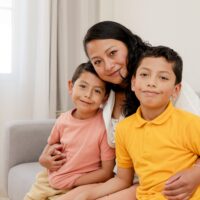Aetiology
-

Mental Health and Parenthood – Maternal Mental Health Matters
This Maternal Mental Health Awareness Week, we encourage you to explore the FREE learning opportunities available on our website and ACAMH Learn, and to share with your networks.
Read more -

The Early Path to Social Anxiety: How Temperament, Attention, and Emotion Interact to Inform Intervention Strategies
In this insightful session, Dr. Koraly Pérez-Edgar, McCourtney Professor of Child Studies at Penn State University, will explore how early-emerging temperament, particularly behavioral inhibition, can influence children’s long-term social and emotional development.
- Event type
- Introductory and Update Session
- Location
- LIVE STREAM
-

Why do some children from low-income families manage to thrive cognitively?
Why do some children from low-income families manage to thrive cognitively? Our study sheds light on this question by identifying key factors that promote cognitive resilience. Blog by Dr. Divyangana Rakesh.
Read more -

Eating Disorders: A Concern for All
Did you know that approximately 22% of children and adolescents worldwide show disordered eating? Eating Disorders Awareness Week (24 February – 2 March 2025) is an opportunity to improve awareness that anyone can have an eating disorder and explore the impact that eating disorders can have on children and young people.
This Eating Disorder Awareness Week, we encourage you to explore the FREE learning opportunities available on our website and ACAMH Learn, and to share with your networks.
Read more -

Fostering Resilience in Challenging Times: Practical Guidelines for Pediatric Mental Health Professionals
In today’s complex youth mental health landscape, professionals play a key role in equipping young people with the skills to navigate adversity. This two-part masterclass, led by world-renowned pediatric neuropsychologist Dr. Sam Goldstein bridges cutting-edge research with practical applications.
- Event type
- Masterclass
- Location
- LIVE STREAM
-

From Valencia to Understanding the Mental Health Impacts of Floods on Children and Young People
Floods are the most common type of natural disaster, with 1.81 billion people facing significant flood risk worldwide, particularly in low- and middle-income countries. Among those affected, children and young people are especially vulnerable due to limited coping strategies compared to adults and high dependence on caregivers. Despite this, research on the impacts of floods on their mental health remains scarce.
Read more -

The Risks and Benefits of Social Media on the Mental Health of Adolescents
This talk will explore the burgeoning use of social media by adolescents in today’s society.
- Event type
- Talk with Q&A
- Location
- LIVE STREAM
-

Professor Henrik Larsson – Editor in Chief
Henrik Larsson is Editor in Chief of JCPP Advances, and Professor of Psychiatric Epidemiology at Örebro University and Karolinska Institutet, Sweden.
Read more -

Dr. Pasco Fearon- Deputing Editor in Chief
Dr. Pasco Fearon is Chair of Developmental Psychopathology in the Division of Psychology & Language Sciences at University College London (UCL).
Read more -

Laurie Hannigan
Laurie Hannigan is a senior researcher based at the Lovisenberg Diaconal Hospital and the Norwegian Institute of Public Health (NIPH), Oslo, Norway. He completed an undergraduate degree in Psychology at the University of Southampton, in the UK, followed by a master’s in Social, Genetic, and Developmental Psychiatry at King’s College London. He obtained his PhD in Behavior Genetics from King’s in 2018.
Read more